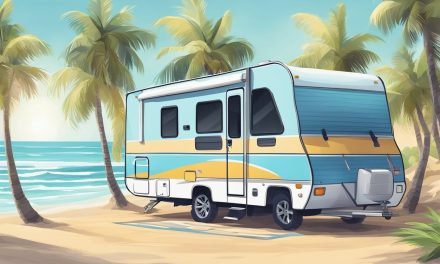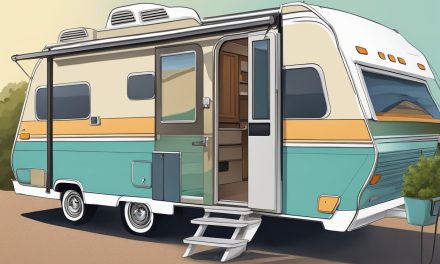Yes, your RV can absolutely have WiFi! In fact, there are 10 different ways to get reliable internet in your RV, and we’ll show you every single one. Whether you’re a weekend camper or a full-time road warrior, staying connected has never been easier or more affordable.
Gone are the days when RVers had to choose between adventure and internet access. Today’s technology makes it possible to stream Netflix, work remotely, and video chat with family from virtually anywhere your RV can go.
The Simple Answer: RVs Can Have Better WiFi Than Your House
Here’s something most people don’t know: modern RV internet can actually be faster and more reliable than home internet. With the right setup, you can get:
- Download speeds up to 220 Mbps (faster than most home connections)
- Unlimited data plans starting at just $50/month
- Internet access in remote locations where houses can’t get service
- Multiple backup options so you’re never disconnected
The key is choosing the right combination of internet sources for your travel style and budget.
10 Ways Your RV Can Have WiFi (From Free to Premium)
1. Campground WiFi (Free but Limited)
What it is: Free internet provided by RV parks and campgrounds.
How it works: Connect to the campground’s network just like hotel WiFi.
Best for:
- Checking email and social media
- Light web browsing
- Budget-conscious campers
Pros:
- Completely free
- No equipment needed
- Available at most RV parks
Cons:
- Often very slow (1-5 Mbps)
- Unreliable during peak hours
- Not secure for sensitive data
- Limited range from your RV
Cost: Free
Would you like to save this article?
2. Smartphone Hotspot (Quick and Easy)
What it is: Using your phone’s cellular data to create WiFi for other devices.
How it works: Turn on your phone’s hotspot feature and connect your laptop, tablet, or streaming device.
Best for:
- Emergency internet access
- Light usage (under 10GB per month)
- Testing cellular coverage in new areas
Pros:
- No extra equipment needed
- Works anywhere you have cell service
- Easy to set up
Cons:
- Drains phone battery quickly
- Limited data allowances
- Slower than dedicated devices
- Can only connect 5-10 devices
Cost: Usually included with phone plans (with data limits)
3. Mobile Hotspot Devices (Most Popular Choice)
What it is: A dedicated device that creates WiFi using cellular networks.
How it works: The device connects to cell towers and broadcasts WiFi to all your devices.
Best for:
- Regular RV travel
- Streaming and video calls
- Multiple device connections
Popular Devices:
- Verizon Jetpack MiFi 8800L
- AT&T MiFi X Pro
- T-Mobile Inseego 5G MiFi M2000
Pros:
- Faster than phone hotspots
- Longer battery life (8-24 hours)
- Can connect 15-30 devices
- Dedicated data plans available
Cons:
- Requires monthly data plan
- Device cost ($100-300)
- Performance depends on cell tower proximity
Cost: $10-160/month + device cost
4. Cellular Routers (Professional Grade)
What it is: A more powerful router that uses cellular data and provides advanced networking features.
How it works: Like a home router, but gets internet from cell towers instead of cable.
Best for:
- Full-time RVers
- Remote workers
- Multiple internet sources
- Large RVs with many devices
Popular Options:
- Pepwave MAX BR1 Pro
- Cradlepoint IBR900
- Netgear Nighthawk M6
Pros:
- Professional-grade performance
- Can use multiple carriers simultaneously
- Advanced features (VPN, load balancing)
- External antenna connections
Cons:
- More expensive than hotspots
- Requires technical knowledge
- Higher power consumption
Cost: $200-800 for router + monthly data plans
5. Starlink Satellite Internet (Game Changer)
What it is: High-speed satellite internet that works virtually anywhere.
How it works: A dish on your RV connects to SpaceX’s network of low-orbit satellites.
Best for:
- Remote boondocking
- Areas with poor cell coverage
- High-speed internet needs
- Full-time RVers
Equipment Options:
- Starlink Standard: $349 (most popular)
- Starlink Mini: $499 (portable, built-in WiFi)
- Flat High Performance: $1,500 (works while driving)
Plan Options:
| Plan | Monthly Cost | Data | Speed |
|---|---|---|---|
| Roam 50GB | $50 | 50GB | 30-100 Mbps |
| Roam Unlimited | $165 | Unlimited* | 30-100 Mbps |
| Priority | $250+ | Up to 5TB priority | 50-220 Mbps |
*Deprioritized after heavy usage
Pros:
- Works in remote locations
- High speeds (often 100+ Mbps)
- Low latency for video calls
- Can pause service when not traveling
Cons:
- High upfront cost
- Monthly fees can be expensive
- Requires clear sky view
- Can be affected by weather
Cost: $349-1,500 equipment + $50-250/month
6. T-Mobile Away (Perfect for RVers)
What it is: T-Mobile’s official RV internet service using 5G technology.
How it works: Uses the same gateway as T-Mobile Home Internet but designed for mobile use.
Best for:
- RVers who stay near populated areas
- High-speed internet needs
- Multiple device connections
Plans Available:
| Plan | Monthly Cost | Data | Features |
|---|---|---|---|
| 200GB | $110 | 200GB | Works while driving |
| Unlimited | $160 | Unlimited | Pause service up to 90 days |
Pros:
- No equipment fees
- Fast 5G speeds (150-300 Mbps)
- Works while driving
- Can pause service
- Connects up to 64 devices
Cons:
- Requires T-Mobile coverage
- More expensive than hotspots
- Performance varies by location
Cost: $110-160/month (no equipment fees)
7. Verizon/AT&T Unlimited Plans (Reliable Coverage)
What it is: Unlimited data plans from major carriers designed for mobile use.
How it works: Use with hotspot devices or cellular routers for unlimited internet.
Best for:
- Areas with good Verizon/AT&T coverage
- Heavy data users
- Reliable connectivity
Typical Plans:
- Verizon: $65-85/month unlimited
- AT&T: $75-100/month unlimited
- Visible (Verizon): $35/month unlimited (5 Mbps hotspot)
Pros:
- Unlimited data available
- Excellent coverage in most areas
- Can use with any compatible device
- No contracts on some plans
Cons:
- May have speed restrictions
- Expensive for unlimited
- Data deprioritization during congestion
Cost: $35-100/month + device
8. WiFi Extenders/Boosters (Enhance Campground WiFi)
What it is: Devices that capture and amplify weak WiFi signals from campgrounds.
How it works: An external antenna captures the campground’s WiFi and rebroadcasts it inside your RV.
Best for:
- Staying at campgrounds with WiFi
- Improving weak signals
- Budget-conscious travelers
Popular Options:
- WiFiRanger Sky Pro Pack
- Winegard ConnecT Wifi Extender
- King WiFiMax Router/Range Extender
Pros:
- Improves campground WiFi speed and range
- One-time purchase
- Works at any campground with WiFi
- Can combine with cellular options
Cons:
- Only works where WiFi already exists
- Still limited by campground’s internet speed
- Requires installation
Cost: $200-500 one-time purchase
9. Combination Systems (Best of All Worlds)
What it is: Systems that automatically switch between cellular, WiFi, and satellite sources.
How it works: Advanced routers that use the best available internet source at any location.
Best for:
- Full-time RVers
- Maximum reliability needs
- Remote workers
- Those who want “set it and forget it” solutions
Popular Systems:
- Pepwave MAX BR1 Pro with multiple carriers
- WiFiRanger systems with cellular backup
- Custom installations with Starlink + cellular
Pros:
- Always connected with best available option
- Automatic failover between sources
- Professional-grade reliability
- Can combine unlimited plans from multiple carriers
Cons:
- Most expensive option
- Complex setup
- Higher monthly costs
- Requires technical knowledge
Cost: $500-2,000+ equipment + multiple monthly plans
10. Portable Satellite Options (Beyond Starlink)
What it is: Other satellite internet providers offering mobile solutions.
How it works: Similar to Starlink but using different satellite networks.
Options Available:
- HughesNet Mobile: Traditional satellite internet for RVs
- Viasat Mobile: Geostationary satellite service
- Future options: Amazon’s Project Kuiper (coming 2025)
Best for:
- Areas where Starlink isn’t available
- Long-term stationary camping
- International travel
Pros:
- Wide coverage areas
- Established technology
- Multiple provider options
Cons:
- Generally slower than Starlink
- Higher latency
- Weather sensitive
- Limited mobile options currently
Cost: Varies by provider and plan
Quick Decision Guide: Which Option is Right for You?
Weekend Warriors (Occasional Use)
Best Choice: Smartphone hotspot + Campground WiFi
Cost: $0-30/month
Why: Simple, affordable, covers basic needs
Regular RVers (Monthly Trips)
Best Choice: Mobile hotspot device + WiFi extender
Cost: $50-100/month + equipment
Why: Reliable connectivity with backup options
Full-Time RVers (Living on the Road)
Best Choice: Starlink + Cellular backup OR T-Mobile Away + Verizon hotspot
Cost: $200-300/month + equipment
Why: Maximum reliability and speed everywhere
Remote Workers (Need Reliable Internet)
Best Choice: Combination system with multiple sources
Cost: $300-500/month + equipment
Why: Professional-grade reliability with redundancy
Boondockers (Off-Grid Camping)
Best Choice: Starlink + cellular booster
Cost: $150-250/month + equipment
Why: Works in remote areas with backup cellular
How Much Data Do You Really Need?
Understanding your data usage helps choose the right plan:
Light Usage (5-20GB/month):
- Email and social media
- Basic web browsing
- Occasional video calls
- Light music streaming
Moderate Usage (50-100GB/month):
- Regular video streaming (Netflix, YouTube)
- Video calls and online gaming
- Cloud backup and file downloads
- Social media with photos/videos
Heavy Usage (200GB+/month):
- Multiple people streaming simultaneously
- 4K video streaming
- Large file uploads/downloads
- Online gaming
- Remote work with video conferencing
Cost Comparison Table
| Solution | Setup Cost | Monthly Cost | Speed | Coverage |
|---|---|---|---|---|
| Campground WiFi | $0 | $0 | 1-10 Mbps | Limited |
| Phone Hotspot | $0 | $10-50 | 5-50 Mbps | Good |
| Mobile Hotspot | $100-300 | $50-100 | 10-100 Mbps | Good |
| Cellular Router | $200-800 | $100-200 | 20-150 Mbps | Excellent |
| Starlink | $349-1,500 | $50-250 | 50-220 Mbps | Excellent |
| T-Mobile Away | $0 | $110-160 | 100-300 Mbps | Good |
| WiFi Extender | $200-500 | $0 | Varies | Limited |
| Combination | $1,000+ | $200-500 | Excellent | Excellent |
Pro Tips for Better RV Internet
Boost Your Signal:
- Park strategically – Face the strongest cell tower
- Use external antennas – Can double your signal strength
- Get a cell signal booster – Amplifies weak signals
- Check coverage maps before traveling
Manage Your Data:
- Adjust streaming quality – Use 720p instead of 4K
- Download content for offline use – Netflix, Spotify, podcasts
- Use data monitoring apps – Track usage in real-time
- Connect to campground WiFi when available to save cellular data
Optimize Your Setup:
- Position equipment properly – Clear line of sight for satellite, height for cellular
- Keep devices updated – Latest software improves performance
- Use quality cables – Poor connections cause speed loss
- Have backup options – Never rely on just one internet source
Common Mistakes to Avoid
❌ Don’t Do This:
- Rely only on campground WiFi
- Buy cheap equipment that breaks easily
- Choose unlimited plans without reading the fine print
- Ignore data usage monitoring
- Set up equipment without proper grounding
✅ Do This Instead:
- Have multiple internet sources
- Invest in quality equipment that lasts
- Read carrier policies on “unlimited” data
- Monitor usage to avoid overage charges
- Follow manufacturer installation guidelines
Future of RV Internet
The RV internet landscape is rapidly improving:
What’s Coming in 2025-2026:
- 5G expansion to more rural areas
- Starlink improvements with faster speeds and lower costs
- Amazon Project Kuiper launching as Starlink competition
- Better integration between cellular and satellite systems
- Lower costs as technology becomes mainstream
Trends to Watch:
- More carriers offering RV-specific plans
- Integration of internet systems into new RV builds
- Improved battery technology for longer off-grid use
- AI-powered network optimization
Conclusion: Your RV Can Have Amazing WiFi
The answer is a resounding YES – your RV can have WiFi, and it can be better than what you have at home!
Whether you choose a simple smartphone hotspot for occasional use or invest in a premium Starlink system for full-time travel, there’s a perfect solution for every RV lifestyle and budget.
Our top recommendations:
- Best Overall: Starlink + cellular backup
- Best Value: Mobile hotspot with unlimited plan
- Best for Beginners: T-Mobile Away
- Best Budget Option: Smartphone hotspot + campground WiFi
The key is to match your internet solution to your travel style, data needs, and budget. Don’t be afraid to start simple and upgrade as your needs change.
Remember: having reliable internet in your RV isn’t a luxury anymore – it’s essential for safety, navigation, entertainment, and staying connected with loved ones.
Ready to get connected? Start with our decision guide above, choose your primary solution, and always have a backup option. Your connected RV adventure awaits!
Sources:
- The Best RV Internet For Every Camper | SatelliteInternet.com
- Is RV WiFi Any Good? RV-ing Experts Dish Out the Truth – TravlFi
- Staying connected on the road: A guide to RV WiFi – Roadtrippers
- Best RV Internet Options – Escapees RV Club
- Best RV Wi-Fi Options: Stay Connected with Top Internet Solutions
- Using Wi-Fi as a Mobile Internet Source for RV & Boat Travels
- Compare The Best RV Internet Service Option For Your RV
- Everything to Know About Satellite Internet for RVs and Vans
- The Best Mobile WiFi Options for RV Living in the US – Outrig
- T-Mobile RV & Camper Internet WiFi Plans







